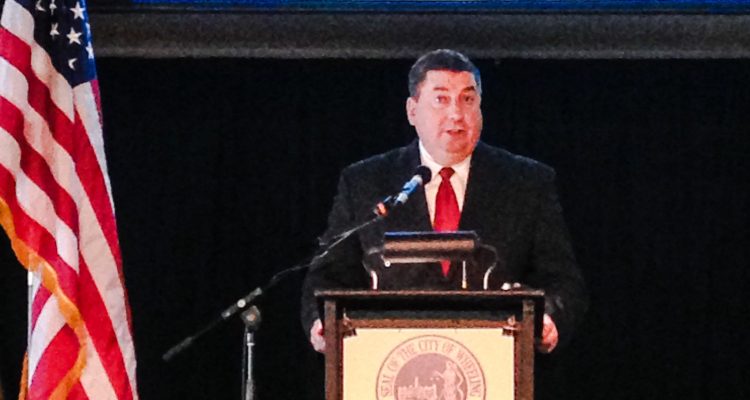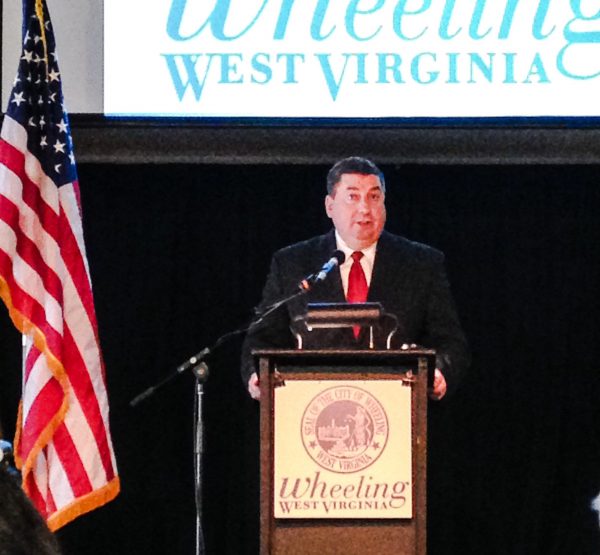Just recently Gene Fahey found out that his family members, on his mother’s side, are direct descendents of the Betty Zane family, the same clan that helped win Wheeling for the frontier-era settlers in the 1780s.
Not that Fahey needs any more name recognition. The Fahey family has been prominent in public service in the Wheeling area for several decades, and his own father, Jack, has served on city council, in the mayor’s office, and with the Ohio County Commission.
Now the 52-year-old Fahey wishes to expand his role after serving as the councilman who has represented Ward Six for the past seven years while also filling the role as the Friendly City’s vice mayor. Now he wishes to erase the “vice” part of that title and become the next mayor of Wheeling, W.Va.
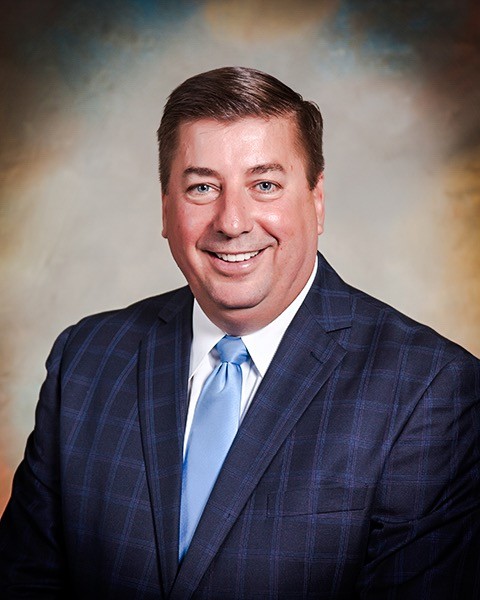
And that’s because Fahey wants to be sure the political can-kicking of important issues does not make a comeback in his hometown after such procrastination vanished with the election of current Mayor Andy McKenzie in 2008. McKenzie had served 12 years as a West Virginia senator before opting to follow Nick Sparachane’s eight years in office, and since he’s orchestrated the following: the construction of a new water treatment plant that should have been built 30 years ago; the repeal of the two-officer-per-cruiser ordinance that was voted in by the people in 1972; the creation of less expensive pension funds for members of the city’s police and fire departments; and the construction of the $4 million J.B. Chambers Recreation Park in East Wheeling that erased a crime-ridden, dilapidated two-block section that haunted the neighborhood for decades.
It is that kind of proactive progress Fahey believes has engaged the people of Wheeling and has led to crowded community meetings, active citizen participation on boards and commissions, and a belief that a Rust Belt town can scrape off the decay on the way to a resurrection.
Fahey will make his official announcement on Tuesday during a 2 p.m. press conference on the third floor of the West Virginia Independence Hall in downtown Wheeling to officially become the second mayoral candidate in the May 10, 2016 election. Wheeling attorney Glenn Elliott, owner of the Professional Building in downtown Wheeling, made his intentions to campaign for the Mayor’s Office known three months ago.
Fahey admits that while he had always paid much attention to the health of the city of Wheeling, he did have to learn the details of the inner workings of the municipality once elected, and now he wishes to utilize that experience to enhance the belief that the Friendly City can grow instead of decline.
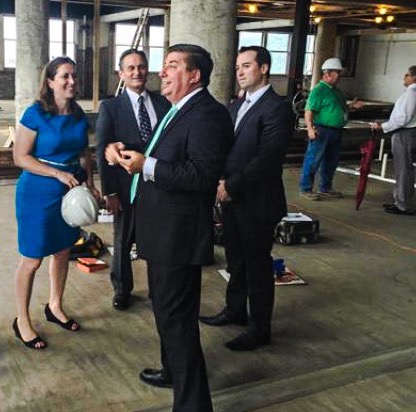
Novotney: Why have you decided to run to be the next mayor of Wheeling?
Fahey: I’ve made that decision because I have watched what good leadership can do for this city in the last seven years. The changes that I have been a part of have really turned the direction of this city, and I would like that leadership to continue.
Novotney: Were you surprised by the many details involved with the operation of a municipality?
Fahey: I was, and I think that would be true for any person who is elected to office for the first time, but being a lifelong resident and an employee of a company founded here in Wheeling, I have paid an extreme amount of attention to what has happened within our city. The learning curve concerning the specifics was pretty great, but I have always had a pretty good sense of the direction that I have wanted to see the city go in.
Novotney: Do you feel there are big shoes to fill following eight years with Andy McKenzie as the mayor?
Fahey: Andy is a wonderful statesman, and he is a terrific leader and a good listener, and the one thing I have learned from Andy is that everything is a group decision. It’s never been like it was his way only. Instead, he has always presented his ideas to the council members and asked us our thoughts.
Andy and I have worked together on many, many occasions on a lot of these issues, and there’s never been once when we went to our colleagues with a particular idea and came out with the same idea, and that’s because of his leadership. It was always a discussion and sometimes it turned into pretty colorful debate, but that was because everyone realized what compromise was all about.
Andy has been an amazing leader, and I’ve been proud to be a part of his team.
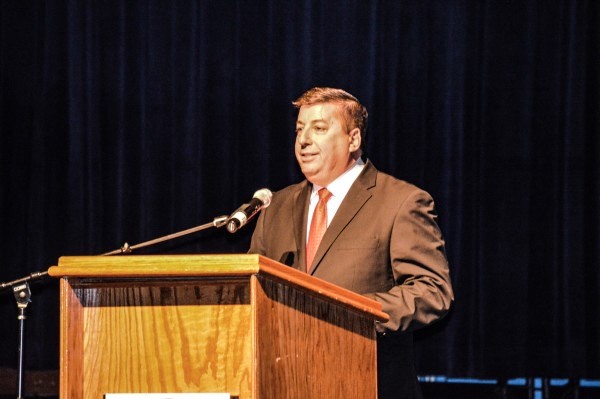
Novotney: Have you and Mayor McKenzie ever disagreed on any of the issues?
Fahey: We sure have.
One of those disagreements involved the implementation of the sales tax in Wheeling. At first he wanted to implement the entire 1 percent sales tax in the beginning, but when I was looking at the costs for our future infrastructure needs, I felt that an entire 1 percent would have been much more than what was actually needed, and I wanted to keep that tax burden down as low as we could while still accomplishing what we needed to accomplish.
I felt a half-percent sales tax for our infrastructure was enough, and it has been enough. And at the time, Andy agreed with me once I showed him the research that I had conducted.
It’s gone both ways over the seven years, and that’s the way it should work.
Novotney: Can you be sure that Wheeling’s financial stability will remain intact for many years to come?
Fahey: Unfortunately, we do not have a crystal ball, so there’s no way you can know for sure, but based on the historical data, the B&O revenues, the sales tax revenue, I am confident that the revenues will remain consistent for years to come.
And the only reason why I can say that is because of the decisions that have been made during the past seven years involving the sales tax, the new pension funds for the police and fire departments, and because there have not issues that council or the mayor has pushed off for future generations.
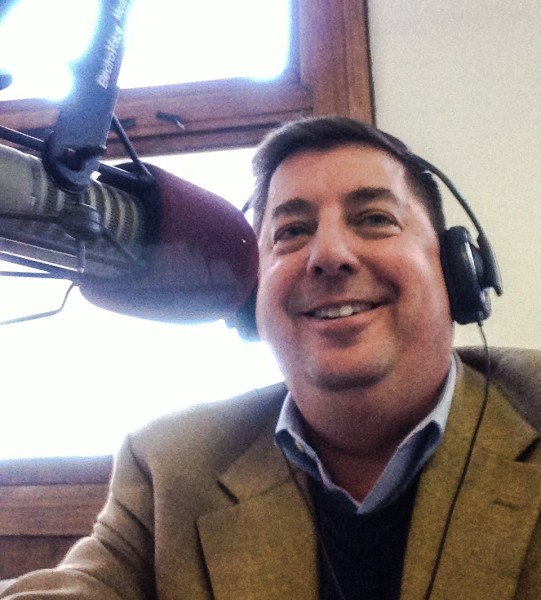
Novotney: What are the most pressing issues in Wheeling at this time?
Fahey: I believe there are three issues that are most pressing.
The first one is our infrastructure, and I can’t say that enough. Until we have every road paved, every water and sewer line repaired or replaced, and we start being proactive with our infrastructure, I will insist that enough has not been done.
No. 2 is our safety forces. We must continue to pay attention to the issues that we have with our fire and police departments because of the importance of protecting our citizens.
And the third issue is economic development. I look at economic development differently from a lot of people do because I want to continue getting our house in order. We need to make sure that our roads are paved, that our city employees are customer friendly, and that our government is operating as efficiently as possible. If all that happens, then when company representatives visit, they will want to invest into our community because they see a solid foundation.
That’s what I think we can do as a city government to enhance the amount of economic development that takes place in Wheeling, W.Va.
Novotney: Do you believe the population of Wheeling will grow in the future, or do you believe the decline will continue?
Fahey: I believe we can grow. I think we will see a stable population from this point, and I can tell you that I have met several new families that have moved here for employment. Does that mean the population is growing? That remains to be seen when the census numbers come out the next time, but the good news is that we are starting to attract new people to Wheeling.
I no longer see the mass exodus taking place although the naysayers insist on saying that it’s going to continue until no one is left. That’s not going to happen, and that’s because of the improvements that have been made by a very proactive council, mayor, and the city manager.
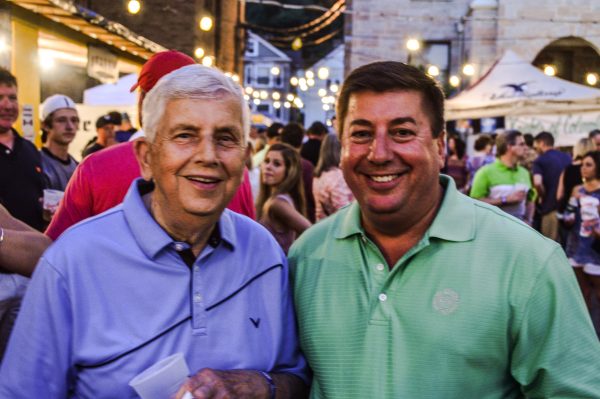
Novotney: Will you knock on doors during your campaign for mayor?
Fahey: I will go door-to-door, and I think it’s going to be a very interesting campaign for me because of how active I have been in the Wheeling community for many, many years. When I look at my campaign, I think it’s going to be a lot about reaching out to people as I am looking for the issues that are important to citizens of this city.
I will go to door-to-door, and I will have community meetings, too. Whatever I think is the best way to engage the people of this city, that’s what I plan to do because I am looking forward to getting the people of this city involved with this process.
In Elm Grove I think we are blessed because we have community meetings each month, and we usually have more than 40 residents who attend those gatherings because they care about their neighborhood. That is so much larger than the other community meetings that take place in other areas of this city, and it shows that we have a good dialogue in Elm Grove.
That’s exactly what I am hoping to bring to those other areas. I want that dialogue to grow because that’s how the issues get resolved.
Novotney: If elected, how will you continue engaging the youthful members of the Wheeling community?
Fahey: A lot of that, I believe, has to do with the appointments to our boards and our commissions, and those appointments give opportunities for the residents to be more involved. There are a lot of people who wish to be involved, and I hope to continue getting more and more people of all ages engaged with the operation of our city.
Novotney: What do you hope to change about Wheeling if elected as the next mayor?
Fahey: I would like to see the overall attitude of our residents continue to improve as it has over the last seven years. I have seen a tremendous change with the overall attitude since I first took office seven years ago. At that time I think the overall attitude was that Wheeling stinks because it didn’t seem as if anything good was happening.
But there were some good things happening then. Orrick had just come to town, and we were seeing some people make some investments then, but our downtown was probably in the worst shape in my lifetime. The Capitol Theatre was closed, the 11 block was falling in on itself, Wesbanco Arena looked tired and old, and no new businesses were moving in.
There was a lot of criticism, and there was a lot of concern, but then the city of Wheeling worked with the Convention and Visitor’s Bureau and many others to take the Capitol back, and that was the turning point, in my opinion. If that had not happened, I am not sure what downtown would look like today. Saving the Capitol Theatre was critical to the thought process of this city as a whole, and now people are thinking differently about this city, and much more is now taking place.
It’s all baby steps because that’s how it needs to take place. There will be no one riding into Wheeling on some gallant horse to save us all. We have to do it ourselves, and we are doing it as a council and as a community.
Novotney: Is it important to you to follow in your father’s footsteps?
Fahey: I am very proud of my father’s public service, but I am 100 percent running on my thoughts, ideas, plans, and actions. I am my own person. He is my father whom I give the most respect to, but this isn’t about me wanting to do what he did.
I have lived all of my life here, and I am doing this because I believe the time is right, I have the experience with leadership to be the next mayor of Wheeling, and I am ready to go forward.
(Photos by Steve Novotney)


